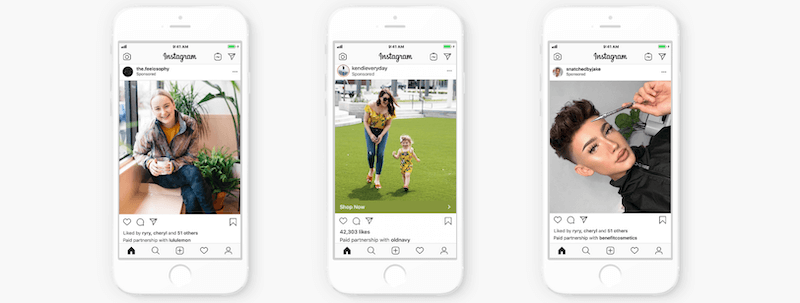What Instagram’s New Branded Content Ads Mean For Travel Brands
Your Instagram feed is about to get much more influencer heavy. This week, the popular social media platform began allowing advertisers to promote...

The past several years have seen the rise of the influencer as a major part of the digital media landscape, from travel to wellness to fashion and beyond. According to Influencer Marketing Hub’s recent survey, more than 380 new influencer marketing-focused agencies and platforms were established in 2019. The same survey reported that the influencer marketing industry is set to grow to approximately $9.7 billion in 2020.
Of course, that was before the COVID-19 crisis brought so many industries to a shuddering halt. Some have already predicted that COVID-19 could signal a death knell for influencer culture. The truth isn’t that simple. The role of influencers is going to change considerably in the upcoming months and years. But don’t count them out just yet. Influencers who have always focused on authenticity are the ones who are maintaining their ground (and even thriving in some cases) during this global pandemic. Those who are unable to adapt and adjust content are being seen as tone deaf, losing followers at a rapid pace and tarnishing brand reputations along with it. It’s never been a more critical time for brands to be thoughtful about engaging with influencers who align with their brand values. 
An overarching theme TURNER is seeing is that COVID-19 has proven how adaptable influencers are. Because influencers are their own models, set designers, photographers, and creators, they can execute high-quality content at a rapid rate compared to a brand. It’s a vital skill set, especially when photo studios are closed and we’re all working from home.
A good example of this kind of influencer flexibility is our work with Mindbody, the leading technology platform for the wellness industry. We pivoted our existing influencer program (which previously featured posts about visits to different sessions and classes within wellness, fitness and beauty) to promote the brand’s new virtual wellness platform, allowing users to - for the first-time ever - be able to access virtual sessions with businesses around the world, right from your home.
After a brief pause to adjust to the new normal, our influencers were ready to jump back in because they see the partnership as an opportunity to provide value to their audiences, work hand in hand with brand to build a meaningful, relationship than ever before in order to communicate impactful messaging to keep viewers connected and entertained during the unknown, since so many people are missing their favorite activities bookable via Mindbody right now. As consumers look to influencers as a voice of authority, brands who leverage authentic influencer relationships will come out on top.
We’re seeing an increase with influencers strengthening connections to their audience. They are using this “down” time to finally sit still, halt on traveling, reflect and for the first time this year, focus on how they can evolve and grow personally and professionally. And this would not be possible without connection to their audience - brands, people, destinations. Ask them how they’re doing, how they’re feeling, what type of content do they want to see, what brands are they loving right now, how influencers can use their platform to help, uplift, and provide support to their fellow fan base, brands and businesses during this time. This is the time for brands to utilize influencer partnerships and build relationships with key creators to help connect with new audiences in a truly authentic way for possibly the first time ever.
Beyond content that provides value, humorous/entertaining content is another type of digital media in demand COVID-19 crisis. Take a look at the upstart video platform TikTok. Previously home to a largely Gen Z user base, the platform is seeing exponential growth among millennials (and even Boomers) as those stuck at home are looking for new outlets of entertainment.
On TikTok, an influencer can go from virtually unknown to superstar status in the blink of an eye. The content is bite-sized, quirky and often deceptively simple. For brands, content created by various individuals can provide valuable — and overlooked — insight into specific demographic behaviors and interests. 
Luxury fashion — generally a slow-moving space — is an industry that’s been quick to adopt TikTok, with TikTok Stars like Cosette Rinab and Charli DiAmelio collaborating with brands and earning huge engagement numbers. As the platform continues to grow (there are currently more than 800 million active users), there’s an opportunity for brands to reach a younger audience. By supplying creators with gear to wear while creating content, or even inviting them to destinations and in-store moments (once those gatherings have returned), brands will develop meaningful, long-term relationships with TikTok influencers, in the same way that they do now with Instagram influencers and media.
Travel influencers are obviously having a tough time right now. What’s a travel influencer if he or she can’t travel? But there’s still some (cautious) optimism, even as the waiting game continues. In the here and now, there are still opportunities for destinations to work closely — from afar — with travel influencers via smart digital strategies. Discover South Carolina recently kicked off a virtual influencer programwith influencers who would’ve traveled to the state by sending them a kit to make pimento cheese, a culinary staple in SC. This allowed them to experience one of South Carolina’s most well-known dishes and capture content that helps spread the word about the destination’s offerings. Depending on how long this crisis lasts, destination and hospitality brands can work to create experiences that can be enjoyed from home and have influencers help them increase bookings for future visits.
While there is much uncertainty on how the world will operate post-COVID-19, one thing we know for certain is that a further shift toward digital offerings will be paramount — from virtual events and remote work locations to on-demand fitness classes and e-commerce options. Fitness instructors will increasingly double as influencers with a shift to subscription-based virtual classes.
On the e-commerce sides, expect affiliate links to increase through social media networks to further incentivize influencers. With potentially less buying power from COVID-19 economic impact, younger generations may also be less inclined (or unable to) purchase a house, opening up a new avenue for tourism to serve as a homebase. As a new wave of digital nomads become the norm, influencers will show how easy it is to work from a different destination. The world is our (digital) oyster. 

Your Instagram feed is about to get much more influencer heavy. This week, the popular social media platform began allowing advertisers to promote...

1 min read
Where digital meets travel + lifestyle … A collection of can’t-miss news from this week. Sign up to get the TURNER Weekly Download in your inbox...

Where digital meets travel + lifestyle … A collection of can’t-miss news from this week. Sign up to get the TURNER Weekly Download in your inbox...